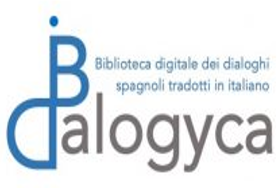1) Dialogue, between transliteration and linguistic and cultural transcoding (Director: Felice Gambin)
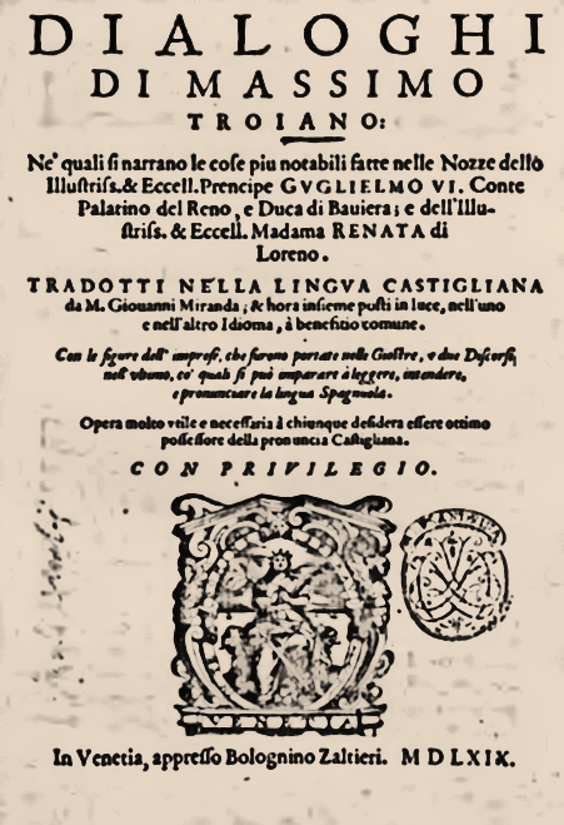
The Verona unit will be in charge, first of all, of the edition of the Dialoghi di Massimo Troiano, “tradotti nella lingua castigliana da Giovanni Miranda […. ] e due discorsi co’ quali si può imparare a leggere, intendere e pronunciare la lingua spagnuola” (Venice, 1569), a text that, in spite of having been hardly studied, is of extraordinary interest for the existence of a bilingual edition that proposes again the book of the Neapolitan musician, printed the previous year in Bavaria, but with the addition of a rather ambiguous presentation by Alfonso de Ulloa that questions the attribution of the translation to Juan de Miranda, indicated on the frontispiece of the work.
Secondly, he will address the fascination that Spanish miscellanies generated in Italian readers through the study of the Garden of Curious Flowers (1555), by Antonio Torquemada, in relation to the Giardino dei fiori curiosi printed by the Italian Orazio Celio Malespini in the last decade of the 16th century (Venice, 1590) and reprinted successively, at least, until 1612, a work of which there is still no modern edition.
Finally, demystifying the cliché of the decline of dialogue in the Baroque period, another aspect that the Verona unit will investigate is the hybridization between historical truth and fiction in dialogue. In this regard, the critical edition – with an introductory study and historical, lexical and philological annotations – of El bodoque contra el Propugnáculo histórico y jurídico del licenciado Conchillos (1667), a text compiled by José Moret towards the end of the period under study of the research project, and which is representative of the satirical dialogues of the period, and of which a modern critical edition is still lacking, will be established.
2) Dialogue, between discursive typology and metalinguistic considerations (Director: Selena Simonatti)
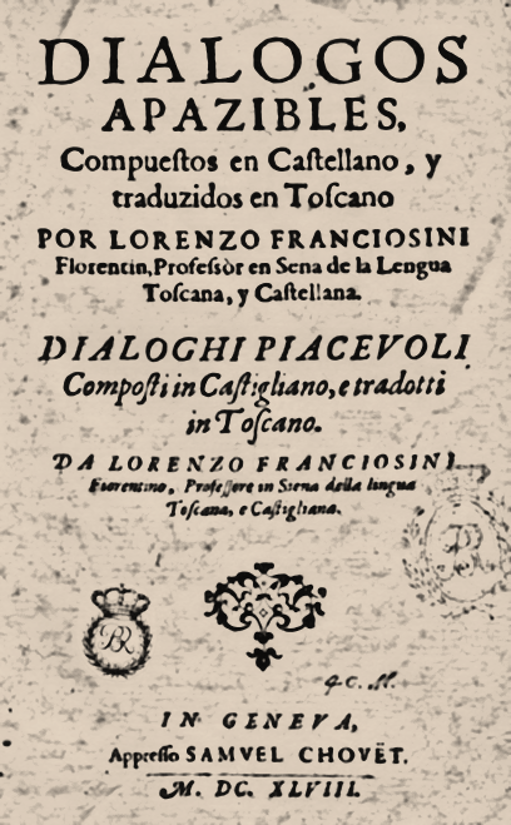
Pisa unit proposes the study of the mimetic status and conversational structures of some segments of Hispanic dialogues, selected on the basis of the argumentative forms, situational variables and discursive signs that guide the nature of the interactions, also including their translations. Particular emphasis will be given to the half serious, half ludicrous tradition of dialogues whose reference authors are Lucian of Samosata and Erasmus of Rotterdam, and to the rich collection of “diálogos escolares” or “didactic talks”, contained in lexicographical or independent works, appeared between the end of the 16th and the first half of the 17th century, and destined to the teaching of Spanish as a foreign language. Finally, Lorenzo Franciosini’s Diálogos apacibles (1626) will receive a considerable attention. Franciosini’s dialogues will be studied in the light of some dialogic fragments of his translation of Quijote (1622 and 1625), in which identical discursive procedures are involved. An annotated critical edition of Franciosini’s Diálogos has been planned, it will be accompanied by a precise historical-linguistic annotation, which would fill an important gap in the study of the dialogic tradition at the service of the teaching of the Spanish language in Europe, namely that concerning Italy.
3) Dialogue, between hybridization and mutation of the genre (Director: Giovanna Fiordaliso)
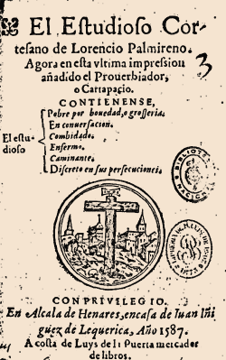
According to the research proposed, the unit of Tuscia will study the use and the function of dialogue in Alonso Jerónimo de Salas Barbadillo’s works, defined as one of the most representative in terms of curiosity, experimentation and originality: an in-depth critical examination of his production, starting from the beginning (El caballero puntual, Corrección de vicios, El necio bien afortunado, Casa del placer honesto) moving then to the more mature manifestations (Don Diego de noche, Corona del Parnaso), will allow the group to analyse in what measure and how dialogue is present as debate instrument which allows the communication of a moral teaching, an “ejemplo provechoso”, aiming at an enhanced communication with a more and more amateur and consumer audience. The research’s objective will be, therefore, that of setting up a broad monographic study aimed to thoroughly investigate the mechanisms of construction of the text, inside which dialogue is inserted fulfilling each time specific purposes, thus emerging as an extremely relevant micro-text in the wider architecture of the macro-text.
A detailed monographic study will deal with dialogue as diegetic micro-structure with didactic and entertainment purposes in the context of the treaties dedicated by the Aragonese humanist Juan Lorenzo Palmireno to the Estudioso de la aldea (1568) and to the Estudioso cortesano (1573). For what concerns entertainment literature, the investigation will also concern the witticisms, “chistes” and “cuentecillos” which compose the Diálogos de apacible entretenimiento (1604) by Gaspar Lucas Hidalgo.
4) Military dialogues (Director: Marcial Rubio Árquez)
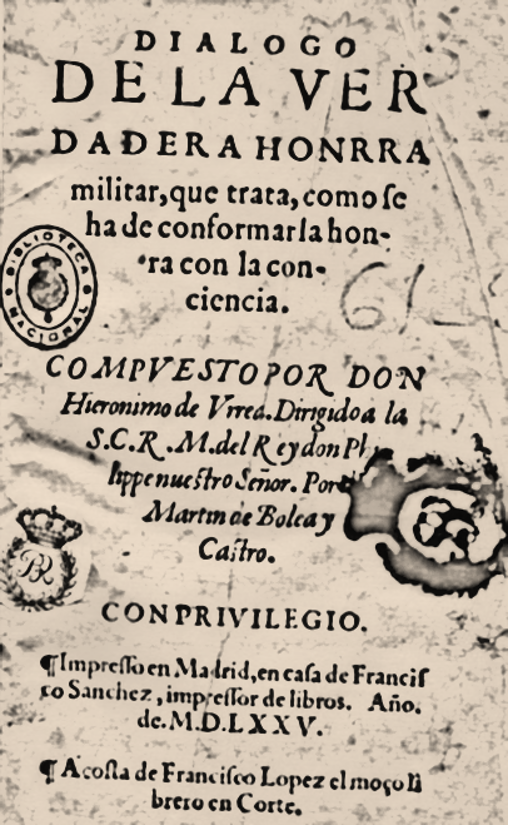
By specifying the potential of a ‘thematic criticism’, still little explored, the purposes of the Pescara unit will converge, firstly, in the increase and renewal of computational tools specifically attributable to the genre of the military art of dialogue, and, secondly, in the critical edition in digital format of the Diálogos de la vida del soldado by Diego Núñez de Alba (Salamanca, 1552), traditionally considered the first attestation of the genre in the area examined, the Diálogo del soldado by Francisco Mexía (Valencia, 1555), up till now unknown and still lacking a modern edition, and the Diálogo de la verdadera honra militar by Jerónimo Jiménez de Urrea (Venice, 1556). Finally, the unit also provides the study of the historical, rhetorical and dialogical aspects of the war genre and its military interlocutors to be included in a monographic issue (in journal or paper), derived from the research results presented in a scientific meeting that will possibly involve, in addition to the heads of the various research units, experts in the field. Starting from the observation of the aspects of the lines of investigation that emerge from the study of military dialogues in the field of translation thematic criticism and interdisciplinary skill within miscellaneous collections of dialogues with literary purposes or with a treatise and manual structure, the aim of the research unit is to identify the treatment of the military theme in its multiple segmentations, in order to determine its real characteristics.
